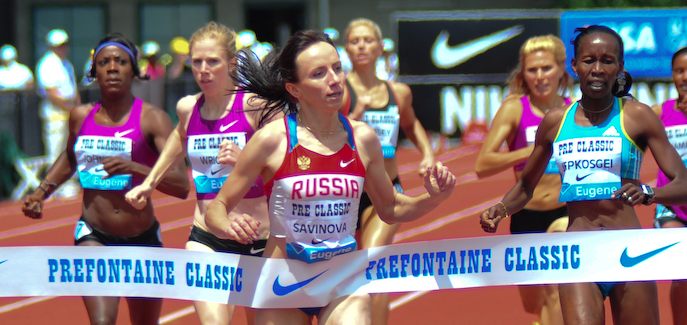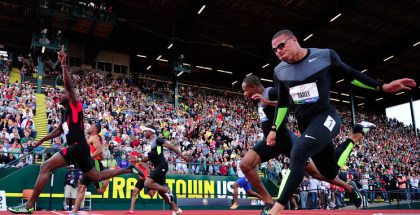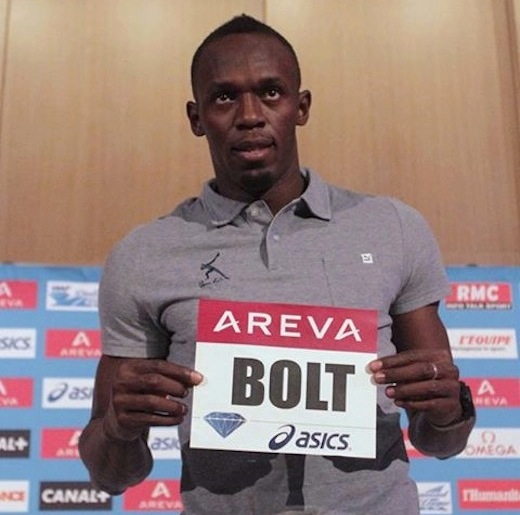The Monday Morning Run: Russian doping, the return of a world record holder, NXN winners
Kevin Sully | On 08, Dec 2014
Photo via TrackTownPhoto
The Monday Morning Run is back after the winter sabbatical. Upon our return we don’t get much actual running news. Instead, we are greeted with our usual themes of massive doping scandals and bureaucratic bungling!
First, to Russia with love…..Chemically enhanced love.
The most important news of the weekend was Hajo Seppelt’s report about widespread doping in Russia. If you don’t know Seppelt, he previously reported on doping in Kenya last year. He is quickly developing into the Grim Reaper of track and field. If he wants to ask you a question, it’s probably time to head in the other direction. Or call a lawyer.
The report uncovers a system where athletes, coaches and officials are all involved in the doping of athletes. If this wasn’t such a well researched and well-developed report, you’d think it was a caricature of an Eastern European training system from the 1980s. It basically covers all of the greatest hits from Ivan Drago’s training in Rocky with some administrative corruption added in for good measure.
To call it a systemic problem is selling it short. Doping was the status quo. Two of the athletes named in the report, Mariya Savinova and Liliya Shobukhova are two of Russia’s best.
Savinova is caught on tape explaining how her coach helps her cover up failed tests. She is the reigning 800-meter Olympic champion.We already knew Shobukhova used drugs. She is currently serving a doping ban for a violation of the biological passport program. What we weren’t aware of was that Russian officials asked for a $600,000 payment in order to allow to race in the 2012 Olympics after she failed a drug test.
Whether this is bribery, extortion or some combination of two is still unclear. Seppelt was able to trace that money back to Valentin Balakhnichev, the head of Russian Athletics and the current treasurer for the IAAF.
Yes, the treasurer.
Because of the money and names involved, the Shobukhova case is getting the most attention. But this report goes so much further than her or Savinova. One Russian athlete makes the claim that 99% of Russian athletes on the national team use performance enhancing drugs. That could be an exaggeration, but it becomes a bit more believable when you consider the depth of the corruption and prevalence of performance enhancing drugs. At one point, Seppelt is able to order EPO over the phone and have it delivered to him. Russian athletes used fake names to avoid detection. Star athletes had tests covered up. Coaches pushed drugs on athletes.
Yuliya Stepanova, an 800-meter runner and focal point of the piece said, “They take any girl, feed her with pills and then she runs. And tomorrow she will be suspended and then they say, we’ll find a new one. They feed her and say, take that, everybody takes it. Take these substances. And if one is caught, they throw away the athlete and take a new one. “
Last week, I spoke with Alex Hutchinson on the podcast. Over the Thanksgiving weekend he wrote a piece for the New York Times entitled, “When Doping Isn’t Cheating.” In a follow-up article on Runner’s World, he argues that anti-doping rules are necessary in part because of the impact on younger athletes.
It’s hard to read about what is happening in Russia and think that young athletes have an actual choice when it comes to doping. That point shouldn’t be confused with acceptance or resignation. These athletes, after all, are competing against people who are following the rules. It does, however, provide some context for why anti-doping rules are important.
Can Russia clean up its own house? Can WADA effectively monitor a country as vast as Russia, especially if the sport’s governing body is enabling the cheating?
In the short term, Balakhnichev should be excused from his current position in the IAAF. I’m sure there are others in high positions in track and field who have checkered pasts, but his offense is so flagrantly against the mission of the organization he represents that it’s absurd that he lasted until the end of last week.
In the bigger picture, perhaps the IAAF/IOC need to look at punishing countries, not just athletes. For example, if an athlete from your country tests positive at a global championship, then that country would lose the ability to enter an athlete at the subsequent Olympics/World Championships. If Savinova tests positive, then Russia only gets two spots in the women’s 800 in the 2016 Olympics as opposed to the normal three (for more on this idea, read Daniel Yi’s paper on the topic).
Initially, I didn’t like the idea. I thought it unfairly impacts clean athletes who happen to compete for dirty countries. The situation in Russia has started to change my mind. There needs to be a greater incentive for countries not to send dirty athletes to major championships. The current suspension structure fuels the cyclical system that Stepanova mentions. If the coaches or administrators are never punished, then they have no reason to play by the rules. Perhaps losing spots in the highest profile meets will at least put pressure at the top.
It doesn’t cure all the problems, but it does shift responsibility on each country to police themselves. WADA’s reach is already limited and if a country is willing to stoop to the depths of what Russia is doing, it becomes impossible.
And, as Seppelt, points out in his report, he has heard of other countries with similar problems.
The Medalists……
The three best performances of the week
Gold: Patrick Makau
Maybe the former world record has another chance of contending for a major marathon victory. He won the Fukuoka Marathon on Saturday in 2:08:22. In marathon terms, that is over a mile away from his personal best of 2:03:38, but it is significant progress for a runner who most considered finished after a string of poor performances and injuries. Since his world record in 2011, he has won only one marathon and had two terrible races in the London Marathon.
Silver: Tanner Anderson
With both the Nike Cross Nationals and the Foot Locker Cross Country Championships serving as unofficial high school championships, it is difficult to know exactly who the best prep runner is each year. Anderson, won the boys’ race at Saturday’s Nike Cross Nationals in Portland. Allie Ostrander won the girls’ race. Chris Chavez has a full recap here.
Bronze: Andrew Bumbalough
USATF finally reinstated Bumbalough after he was incorrectly disqualified at the USA Indoor Championships just a scant nine months ago. Why it took that long is an unanswered question. There was an entire report dedicated to the dueling DQ controversies in Albuquerque, but I still don’t get why USATF couldn’t admit the error and move on in March. Bumbalough, after all, finished eighth. This did not involve a place on the national team or a large amount of prize money. And yet, by prolonging the process, USATF managed to turn this issue into something much larger than it needed to be. For his patience, I’m elevating Bumbalough to an honorary third place.
In football it takes a commercial break to review a play. In track and field it takes 9 months.
— Riley Masters (@riley_masters) December 6, 2014
In case you missed it…….
-In an effort to let your frustration stew for the next two years, the IAAF announced that there will be morning finals for track and field events at the Rio Olympics. For track fans, of course this is a traveshamockery.
In stings even more for us in the United States. Since the Atlanta Olympics, all of the summer games have taken place several time zones ahead. Rio’s schedule was supposed to be much friendlier with the finals in primetime. But the American track fan’s burden is large and once again you will be forced to stream the 10,000 online at your desk or duck out of a meeting and catch it on your iPhone. I’m letting you know now because you still have 19 months to avoid this altogether and become unemployed.
-According to Track and Field News, the USA Indoor Championships next year will include the odd distances of 300, 600, 2 mile. I love this decision for the interesting match-ups it creates and the prospect of obscure world records. With no World Championship to qualify for it adds an interesting dynamic to what might be a dull meet.
Instead, you could get Alysia Montano vs. Sanya Richards-Ross in the women’s 600. Lashawn Merritt vs. Duane Soloman in the men’s 600. Lashawn Merritt (again) vs. Wallace Spearmon in the 300. In the women’s 300, Allyson Felix vs. oh my god Allyson Felix would be invincible in a 300…….
-Kenya, you didn’t think you would be able to sneak Matthew Kisorio on your team for the Chiba Ekiden without notice did you? Fresh off a doping ban, and with the country still reeling from the Rita Jeptoo positive test, Kisorio ran the fifth leg for the Kenyan team. Kenya finished second to Japan in the race, but took home the Tone Deafness To Public Opinion award. They literally have at least 50 other people who can run as fast as Kisorio and they chose to put the guy on the team who just became eligible to run.
–Seb Coe formally announced his candidacy for president of the IAAF. If you are short on reading material, here is his full 20 page manifesto. If he gets the job, I’m guessing he might get a few questions about doping.
-No more “B” standards for World Championship qualifying. Our own Jim McDannald has a primer on the new standards that the IAAF is implementing for the 2015 season. The slower qualifying marks (slower than the old “A” standards that is) will alleviate some of the standards chasing that confuses so many of us each summer.
–Mo Farah is planning on running the Great Edinburgh Cross Country meet in Scotland in January. Does this mean he will run the World Cross Country Championships? Probably not, but it’s never too early to get your hopes up.



















Submit a Comment